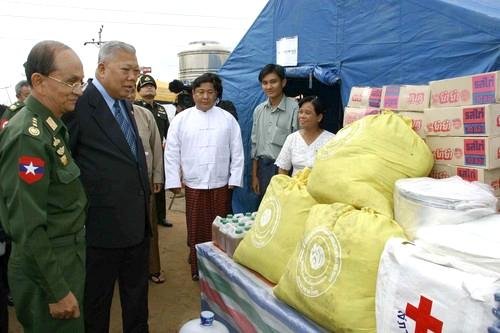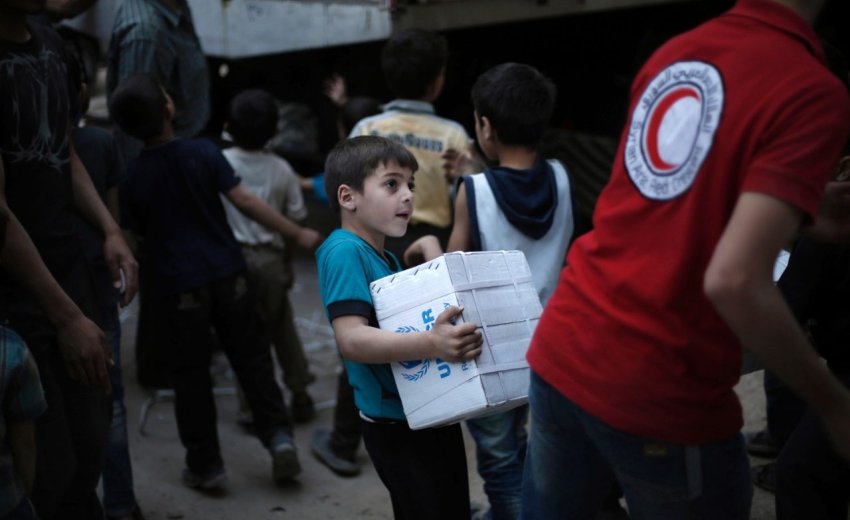May 14, 2008 - UNITED NATIONS -- Myanmar's cyclone and China's earthquake highlight a question that the U.N. often struggles with: what to do when a country's people need outside help but the government rejects it.
Myanmar's isolated military regime is still allowing only a "trickle" of aid and a few international aid workers into the country, the U.N. said Tuesday, reaching about a quarter of the 1.5 million people affected by the recent cyclone that killed more than 34,000 people. Meanwhile, China has welcomed foreign money and supplies, but not international rescue teams, to help survivors of the earthquake that has killed more than 12,000.
Injured villagers mill around their destroyed homes in Boglay township, one of the regions of Myanmar hit hardest by Cyclone Nargis.
China has responded quickly to its disaster, but Myanmar is "simply not up to the task," British Ambassador John Sawers said. He called it "shocking" that Myanmar's top leader, Senior Gen. Than Shwe, hasn't taken Secretary-General Ban Ki-moon's calls since Tropical Cyclone Nargis struck May 2-3. Ban, in "immense frustration," said he has had to ask regional leaders to press the case.Rejection of outside aid by governments in times of crisis is not unprecedented. India did so after the 2004 tsunami, China after floods last year and after the 1976 Tangshan earthquake that took more than 240,000 lives. The United States also turned down offers of help from the U.N. and other nations after Hurricane Katrina. Such decisions are generally made out of national pride and in efforts by governments to demonstrate their capability to care for their own people.
Myanmar's case appears particularly dire. U.N. officials believe the regime's inability to quickly aid victims and prevent the spread of disease could double the death toll.
A Burmese cyclone survivor carries a bag of rice at a cyclone
devastated area near Kunyangon, Southern Myanmar
France's foreign minister, Bernard Kouchner, last week called Myanmar's tepid response to outside assistance a crime against humanity and demanded that food be airdropped, even without permission, to fulfill "the responsibility to protect." That proposal was rejected by the U.N. as both impolitic and impractical.
"I'm not sure that invading Myanmar would be a very sensible option at this particular moment," humanitarian chief John Holmes said.
The Security Council split on whether to demand that Myanmar, also known as Burma, admit aid workers, with China and others arguing that it is up to each nation to handle its internal affairs and that the "responsibility to protect" doctrine does not apply to natural disasters.
"It is certainly not a classic case," said Edward Luck, the U.N.'s special advisor on the responsibility to protect. "While lawyers can argue whether neglecting hundreds of thousands of people is a crime against humanity, the member states by and large are very uncomfortable applying it to this situation."

Thai Prime Minister Samak Sundaravej, second from left, presents relief supplies
donated by Thailand to Myanmar Prime Minister Thein Sein, left, in Tangon.
The U.N. already faces examples of governments' neglect of their people and obstruction of outside help in places with food shortages or ongoing violence such as Darfur, Zimbabwe and North Korea. Humanitarian workers operate under strict limitations on how long they can stay, where they can travel and what they can publicly say.
"What you've got to do is keep pressuring the regime, and have neighboring countries do it too," Luck said. "In Myanmar, they've been opening up inch by inch, though we wish it would be mile by mile."
"If Myanmar's authorities and foreign agencies start cooperating," said a former U.N. official familiar with Myanmar who did not want to be named, "it could be a turning point for both sides: for the government in terms of accepting and learning to work with the international aid community, and for some Western governments in accepting that sometimes you have to work with this regime if you really want to help."
When diplomats and disaster do succeed in cracking open the door, sometimes it stays open. Aceh province in Indonesia and some Tamil Tiger-controlled areas in Sri Lanka were closed to foreigners before the 2004 tsunami.
Aid workers came in, and the crisis became a catalyst for peace after a three-decade-long war between Aceh separatists and the Indonesian government. In Sri Lanka, most humanitarian groups left after a cease-fire failed. But some aid workers remain in Aceh, where nearly 170,000 people died.
